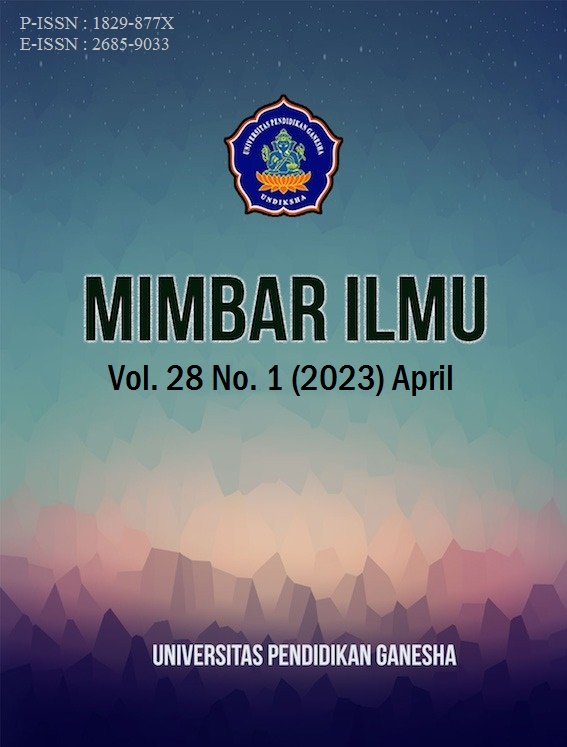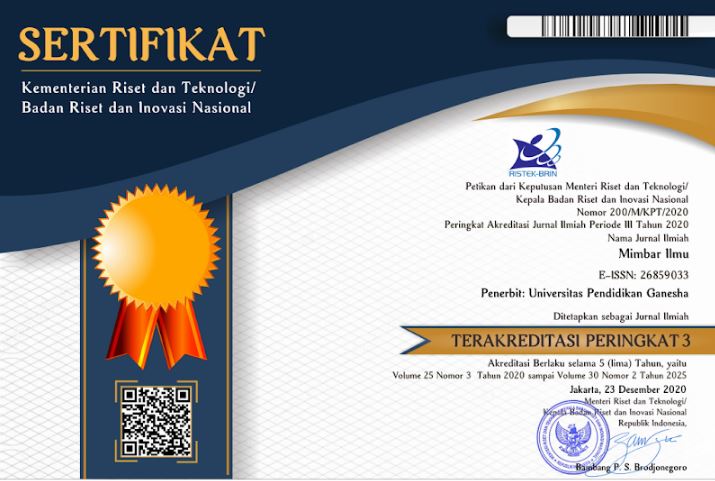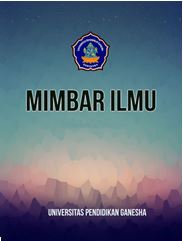What do Elementary School Teachers Think About 6Cs?
DOI:
https://doi.org/10.23887/mi.v28i1.55857Kata Kunci:
Teacher Perceptions, 21st Century Skills, 6 CsAbstrak
21st-century skills are very important to be instilled in every learning process in elementary schools. Teachers must have the view that is instilling the 6 Cs. This study aims to analyze elementary school teachers' perceptions regarding 21st-century skills, especially the 6 Cs in learning in elementary schools. The method used in this research is the descriptive method. The research subjects were obtained randomly, namely as many as 71 elementary school teachers. The research instrument used a questionnaire in the form of a Google form. The data obtained were then analyzed, and the categories were determined. The results showed that elementary school teachers' perceptions of the knowledge aspect, namely 21st-century skills, must be owned and instilled in students in the 21st century, which is very high. In the aspect of understanding, the teacher's perception of the reasons for the importance of the 6 Cs instilling in elementary school students is also very high. In the implementation aspect, teachers have a high perception of instilling the 6 Cs in elementary school learning, either through innovative learning models or through interactive learning media.
Referensi
Adijaya, M. A., Widiana, I. W., Parwata, I. G. L. A., & Antara, I. G. W. S. (2023). Bloom’s Taxonomy Revision-Oriented Learning Activities to Improve Procedural Capabilities and Learning Outcomes. International Journal of Educational Methodology, 9(1), 261–270. https://doi.org/10.12973/ijem.9.1.261. DOI: https://doi.org/10.12973/ijem.9.1.261
Afandi, A., Sajidan, S., Akhyar, M., & Suryani, N. (2019). Development frameworks of the Indonesian partnership 21 st -century skills standards for prospective science teachers: A Delphi study. Jurnal Pendidikan IPA Indonesia, 8(1), 89–100. https://doi.org/10.15294/jpii.v8i1.11647. DOI: https://doi.org/10.15294/jpii.v8i1.11647
Ahsani, E. L. F., Romadhoni, N. W., Layyiatussyifa, E. L., Ningsih, N. A., Lusiana, P., & Roichanah, N. N. (2021). Penguatan Literasi Digital Dalam Pembelajaran Di Sekolah Dasar Indonesia Den Hag. Elementary School, 8(2), 228–236. https://doi.org/10.31316/esjurnal.v8i2.1115. DOI: https://doi.org/10.31316/esjurnal.v8i2.1115
Anagün, Ş. S. (2018). Teachers’ Perceptions about the Relationship between 21st Century Skills and Managing Constructivist Learning Environments. International Journal of Instruction, 11(4), 825–840. https://eric.ed.gov/?id=EJ1191700. DOI: https://doi.org/10.12973/iji.2018.11452a
Ananiadou, K., & Claro, M. (2009). 21st century skills and competences for new millennium learners in OECD countries. In OECD Education Working Papers (p. 41). https://doi.org/10.1787/218525261154. DOI: https://doi.org/10.1787/218525261154
Anggraeni, P., Sunendar, D., Maftuh, B., Sopandi, W., & Puspita, R. D. (2022). Why 6 Cs ? The Urgency of Learning at Elementary School. International Conference on Educational Development and Quality Assurance (ICED-QA 4), 650, 35–41. https://doi.org/10.2991/assehr.k.220303.008. DOI: https://doi.org/10.2991/assehr.k.220303.008
Antara, I. G. W. S., Suma, K., & Parmiti, D. P. (2022). E-Scrapbook: Konstruksi Media Pembelajaran Digital Bermuatan Soal-soal Higher Order Thinking Skills. Jurnal Edutech Undiksha, 10(1), 11–20. https://doi.org/10.23887/jeu.v10i1.47559.
Asari, A., Kurniawan, T., Ansor, S., Bagus, A., & Rahma, N. (2019). Kompetensi Literasi Digital Bagi Guru Dan Pelajar Di Lingkungan Sekolah Kabupaten Malang. BIBLIOTIKA: Jurnal Kajian Perpustakaan Dan Informasi, 3(2), 98–104. https://doi.org/10.17977/um008v3i22019p98-104.
Bell, S. (2010). Project-Based Learning for the 21st Century: Skills for the Future. The Clearing House: A Journal of Educational Strategies, Issues and Ideas, 83(2), 39–43. https://doi.org/10.1080/00098650903505415. DOI: https://doi.org/10.1080/00098650903505415
Binkley, M., Erstad, O., Herman, J., Raizen, S., Ripley, M., Miller-Ricci, M., & Rumble, M. (2012). Defi ning Twenty-First Century Skills. Assessment and Teaching of 21st Century Skills, 9789400723, 1–345. https://doi.org/10.1007/978-94-007-2324-5. DOI: https://doi.org/10.1007/978-94-007-2324-5_2
Breivik, P. S. (2010). 21St Century Learning and Information Literacy. Change: The Magazine of Higher Learning, 37(2), 21–27. https://doi.org/10.3200/chng.37.2.21-27. DOI: https://doi.org/10.3200/CHNG.37.2.21-27
Buchari, A. (2018). Peran Guru dalam Pengelolaan Pembelajaran. Jurnal Ilmiah Iqra’, 12(2), 106–124. https://doi.org/10.30984/jii.v12i2.897. DOI: https://doi.org/10.30984/jii.v12i2.897
Conole, G. (2014). The 7Cs of Learning Design – A new approach to rethinking design practice. 9th International Conference on Networked Learning, 502–509. http://www.lancaster.ac.uk/fss/organisations/netlc/past/nlc2014/abstracts/pdf/conole.pdf.
Darmayanti, S. E., & Wibowo, U. B. (2014). Evaluasi Program Pendidikan Karakter Di Sekolah Dasar Kabupaten Kulon Progo. Jurnal Prima Edukasia, 2(2), 223. https://doi.org/10.21831/jpe.v2i2.2721. DOI: https://doi.org/10.21831/jpe.v2i2.2721
Fullan, M. (2007). The New Meaning of Educational Change (4th ed.). Teachers College Press.
Golinkoff, R. M., & Hirsh-Pasek, K. (2016). Becoming Brilliant: What Science Tells Us About Raising Successful Children. American Psychological Association. https://doi.org/10.1007/978-3-658-32079-9_19. DOI: https://doi.org/10.1037/14917-000
Hasan, S. H. (2019). Pendidikan Sejarah untuk Kehidupan Abad KE-21. Historia: Jurnal Pendidik Dan Peneliti Sejarah, 2(2), 61–72. https://doi.org/10.17509/historia.v2i2.16630. DOI: https://doi.org/10.17509/historia.v2i2.16630
Iskandarwassid, & Sunendar, D. (2018). Strategi Pembelajaran Bahasa. Remaja Rosdakarya.
Jacobson-Lundeberg, V. (2016). Pedagogical Implementation of 21st Century Skills. Educational Leadership and Administration: Teaching and Program Development, 27, 82–100. https://eric.ed.gov/?id=EJ1094407.
Junedi, B., Mahuda, I., & Kusuma, J. W. (2020). Optimalisasi keterampilan pembelajaran abad 21 dalam proses pembelajaran pada Guru MTs Massaratul Mut’allimin Banten. Transformasi: Jurnal Pengabdian Masyarakat, 16(1), 63–72. https://doi.org/10.20414/transformasi.v16i1.1963. DOI: https://doi.org/10.20414/transformasi.v16i1.1963
Karta, I. W., Suarta, N., Rasmini, N. W., Widiana, I. W., Putri, N. N. C. A., & Antara, I. G. W. S. (2022). The Impact of Tri Pramana-based Hypothetic Deductive Learning Cycle Model on Character Forming and Creativity Development in Early Childhood. Educational Sciences: Theory & Practice, 22(2), 239–249. https://doi.org/10.12738/jestp.2022.2.0017.
Kereluik, K., Mishra, P., Fahnoe, C., & Terry, L. (2013). What Knowledge Is of Most Worth: Teacher Knowledge for 21st Century Learning. Journal of Digital Learning in Teacher Education, 29(4), 127–140. https://doi.org/10.1080/21532974.2013.10784716. DOI: https://doi.org/10.1080/21532974.2013.10784716
Kim, S., Raza, M., & Seidman, E. (2019). Improving 21st-century teaching skills: The key to effective 21st-century learners. Research in Comparative and International Education, 14(1), 99–117. https://doi.org/10.1177/1745499919829214. DOI: https://doi.org/10.1177/1745499919829214
Kivunja, C. (2014). Do You Want Your Students to Be Job-Ready with 21st Century Skills? Change Pedagogies: A Pedagogical Paradigm Shift from Vygotskyian Social Constructivism to Critical Thinking, Problem Solving and Siemens’ Digital Connectivism. International Journal of Higher Education, 3(3), 81–91. https://doi.org/10.5430/ijhe.v3n3p81. DOI: https://doi.org/10.5430/ijhe.v3n3p81
Lase, D. (2020). Pendidikan di Era Revolusi Industri 4.0 Education. Jurnal Sundermann, 12(2), 28–43. https://doi.org/10.36588/sundermann.v1i1.18. DOI: https://doi.org/10.36588/sundermann.v1i1.18
Maftuh, B. (2011). Status of ICT Integration in Education in Southeast Asian Countries. Tsukuba International Conference: Innovation of Classroom Teaching and Learning through Lesson Study, 1–9. https://www.criced.tsukuba.ac.jp/math/apec/apec2011/19-20/06_BunyaminMaftuh-paper.pdf.
Mahendra, A. P. R. (2018). Pembelajaran PPKn Dalam Resonansi Kebangsaan dan Globalisasi. Jurnal Ilmiah Ilmu Sosial, 4(2), 120–126. https://doi.org/10.23887/jiis.v4i2. DOI: https://doi.org/10.23887/jiis.v4i2.16526
Mahmud, M., Darmawan, D., Suherman, U., & Jamilah, J. (2018). Survey Tingkat Pengetahuan Dan Kompetensi Guru Tentang Teknologi Informasi Dan Komunikasi Di Kabupaten Garut. Pedagogia, 15(3), 266. https://doi.org/10.17509/pdgia.v15i3.11022. DOI: https://doi.org/10.17509/pdgia.v15i3.11022
Malik, R. S. (2018). Educational Challenges in 21St Century and Sustainable Development. Journal of Sustainable Development Education and Research, 2(1), 9. https://doi.org/10.17509/jsder.v2i1.12266. DOI: https://doi.org/10.17509/jsder.v2i1.12266
Mayasari, T., Kadarohman, A., Rusdiana, D., & Kaniawati, I. (2016). Apakah Model Pembelajaran Problem Based Learning Dan Project Based Learning Mampu Melatihkan Keterampilan Abad 21? Jurnal Pendidikan Fisika Dan Keilmuan (JPFK), 2(1), 48. https://doi.org/10.25273/jpfk.v2i1.24. DOI: https://doi.org/10.25273/jpfk.v2i1.24
Parmiti, D. P., Antara, I. G. W. S., & Wulandari, I. G. A. A. M. (2022). The Effectiveness of E-Scrapbook Media Containing HOTS Questions on Science Learning Outcomes of Elementary School Students. Journal of Education Research and Evaluation, 6(3), 484–491. https://doi.org/10.23887/jere.v6i3.52078. DOI: https://doi.org/10.23887/jere.v6i3.52078
Putu, N., Wulandari, D., & Wiarta, I. W. (2022). Media Pembelajaran Interaktif Sifat-Sifat Bangun Ruang Berbasis Guided Discovery Materi Kubus dan Balok. 10(1), 21–32.
Redhana, I. W. (2019). Mengembangkan keterampilan abad ke-21 dalam pembelajaran kimia. Jurnal Inovasi Pendidikan Kimia, 13(1). https://doi.org/10.15294/jipk.v13i1.17824.
Riduwan. (2021). Peningkatan Kompetensi Guru Dalam Mengajar Melalui Pembimbingan Pemanfaatan Media Online Dalam Pembelajaran Bdr Pada Semester Genap Di Sd Negeri 1 Sungai Tendang Kecamatan Kumai Kabupaten Kotawaringin Barat Tahun Pelajaran 2019 / 2020. Anterior Jurnal, 20(2), 159–169. https://media.neliti.com/media/publications/365902-none-6b66fa9e.pdf.
Saavedra, A. R., & Opfer, V. D. (2012). Learning 21st-Century Skills Requires 21st-Century Teaching. Phi Delta Kappan, 94(2), 8–13. https://doi.org/10.1177/0031721712094002. DOI: https://doi.org/10.1177/003172171209400203
Safitri, S., & Ramadan, Z. H. (2022). Implementasi Literasi Budaya dan Kewargaan di Sekolah Dasar. Mimbar Ilmu, 27(1), 109–116. https://doi.org/10.23887/mi.v27i1.45034. DOI: https://doi.org/10.23887/mi.v27i1.45034
Salsabila, U. H., & Agustian, N. (2021). Peran Teknologi Pendidikan dalam Pembelajaran. Islamika : Jurnal Keislaman Dan Ilmu Pendidikan, 3(1), 123–133. https://doi.org/10.36088/islamika.v3i1.1047. DOI: https://doi.org/10.36088/islamika.v3i1.1047
Sang, G., Liang, J. C., Chai, C. S., Dong, Y., & Tsai, C. C. (2018). Teachers’ actual and preferred perceptions of twenty-first century learning competencies: a Chinese perspective. Asia Pacific Education Review, 19(3), 307–317. https://doi.org/10.1007/s12564-018-9522-0. DOI: https://doi.org/10.1007/s12564-018-9522-0
Santika, I. G. N. (2021). Grand Desain Kebijakan Strategis Pemerintah Dalam Bidang Pendidikan Untuk Menghadapi Revolusi. Jurnal Education and Development, 9(2), 369–377. https://doi.org/10.37081/ed.v9i2.2500.
Sari, N. K., & Puspita, L. D. (2019). Implementasi Pendidikan Karakter di Sekolah Dasar. Dikdas Bantara, 2(1), 57–72. http://journal.univetbantara.ac.id/index.php/dikdasbantara/article/view/182/152. DOI: https://doi.org/10.32585/jdb.v2i1.182
Selman, Y. F., & Jaedun, A. (2020). Evaluation of The Implementation of 4C Skills in Indonesian Subject at Senior High Schools. Jurnal Pendidikan Indonesia, 9(2), 244–257. https://doi.org/10.23887/jpi-undiksha.v9i2.23459.
Shiroishi, Y., Uchiyama, K., & Suzuki, N. (2018). Society 5.0: For Human Security and Well-Being. IEEE Transaction on Sustainable Computing, 51(18), 91–95. https://doi.org/10.1109/MC.2018.3011041. DOI: https://doi.org/10.1109/MC.2018.3011041
Siddiq, F., Gochyyev, P., & Wilson, M. (2017). Learning in Digital Networks – ICT literacy: A novel assessment of students’ 21st century skills. Computers and Education, 109, 11–37. https://doi.org/10.1016/j.compedu.2017.01.014. DOI: https://doi.org/10.1016/j.compedu.2017.01.014
Silber-Varod, V., Eshet-Alkalai, Y., & Geri, N. (2019). Tracing research trends of 21st-century learning skills. British Journal of Educational Technology, 0(0), 1–20. https://doi.org/10.1111/bjet.12753. DOI: https://doi.org/10.1111/bjet.12753
Silvana, H., Rullyana, G., & Hadiapurwa, A. (2019). Kebutuhan Informasi Guru Di Era Digital: Studi Kasus Di Sekolah Dasar Labschool Universitas Pendidikan Indonesia. Baca: Jurnal Dokumentasi Dan Informasi, 40(2), 147. https://doi.org/10.14203/j.baca.v40i2.454. DOI: https://doi.org/10.14203/j.baca.v40i2.454
Sopandi, W. (2023). Model Pembelajaran RADEC (Teori dan Implementasi di Sekolah). UPI Press.
Soule, H., & Warrick, T. (2015). Defining 21st Century Readiness for All Students : What We Know and How to Get There. Psychology of Aesthetics, Creativity, and the Arts, 9(2), 178–186. https://doi.org/10.1037/aca0000017. DOI: https://doi.org/10.1037/aca0000017
Sujana, A., & Sopandi, W. (2020). Model-Model Pembelajaran Inovatif: Teori dan Implementasi. Rajawali Pers.
Susilo, A., & Sarkowi, S. (2018). Peran Guru Sejarah Abad 21 dalam Menghadapi Tantangan Arus Globalisasi. Historia: Jurnal Pendidik Dan Peneliti Sejarah, 2(1), 43–50. https://doi.org/10.17509/historia.v2i1.11206. DOI: https://doi.org/10.17509/historia.v2i1.11206
Taunu, E. S. H., & Iriani, A. (2019). Evaluasi Program Penguatan Pendidikan Karakter Terintegrasi Mata Pelajaran Matematika di SMP Negeri. Kelola: Jurnal Manajemen Pendidikan, 6(1), 64–73. https://doi.org/10.24246/j.jk.2019.v6.i1.p64-73. DOI: https://doi.org/10.24246/j.jk.2019.v6.i1.p64-73
Trilling, B., & Fadel, C. (2009). 21st century skills: Learning for life in our times. John Wiley & Sons.
Tuzlukova, V., Al Busaidi, S., Burns, S., & Bugon, G. (2018). Exploring Teachers’ Perceptions of 21St Century Skills in Teaching and Learning in English Language Classrooms in Oman’S Higher Education Institutions. Journal of Teaching English for Specific and Academic Purposes, 6(1), 191. https://doi.org/10.22190/jtesap1801191t. DOI: https://doi.org/10.22190/JTESAP1801191T
Voogt, J., Erstad, O., Dede, C., & Mishra, P. (2013). Challenges to learning and schooling in the digital networked world of the 21st century. Journal of Computer Assisted Learning, 29(5), 403–413. https://doi.org/10.1111/jcal.12029. DOI: https://doi.org/10.1111/jcal.12029
Warsono, M. S., & Hariyanto. (2017). Pembelajaran Aktif Teori dan Asesmen. Remaja Rosdakarya.
Unduhan
Diterbitkan
Cara Mengutip
Terbitan
Bagian
Lisensi
Hak Cipta (c) 2023 Poppy Anggraeni

Artikel ini berlisensiCreative Commons Attribution-ShareAlike 4.0 International License.
This work is licensed under a Creative Commons Attribution-ShareAlike 4.0 International License.
Authors who publish with this journal agree to the following terms:
- Authors retain copyright and grant the journal right of first publication with the work simultaneously licensed under a Creative Commons Attribution License that allows others to share the work with an acknowledgment of the work's authorship and initial publication in this journal.
- Authors are able to enter into separate, additional contractual arrangements for the non-exclusive distribution of the journal's published version of the work (e.g., post it to an institutional repository or publish it in a book), with an acknowledgment of its initial publication in this journal.
- Authors are permitted and encouraged to post their work online (e.g., in institutional repositories or on their website) prior to and during the submission process, as it can lead to productive exchanges, as well as earlier and greater citation of published work.









